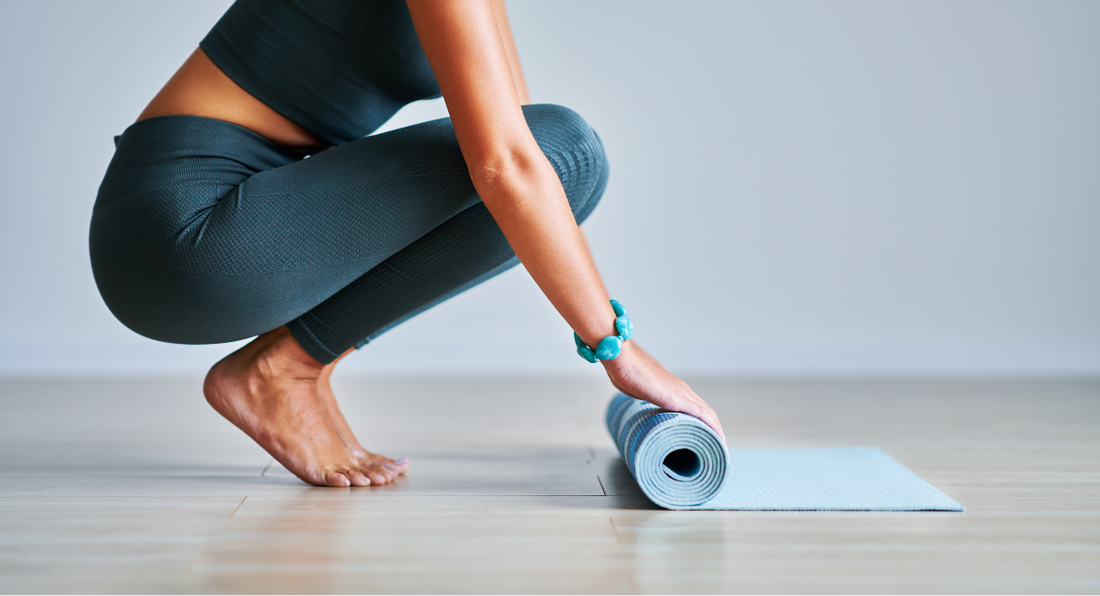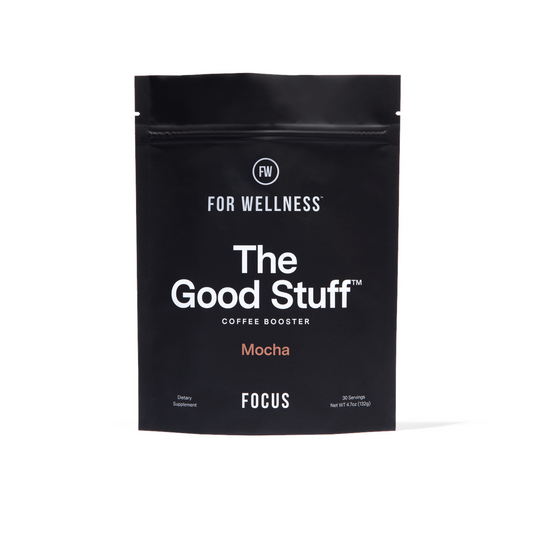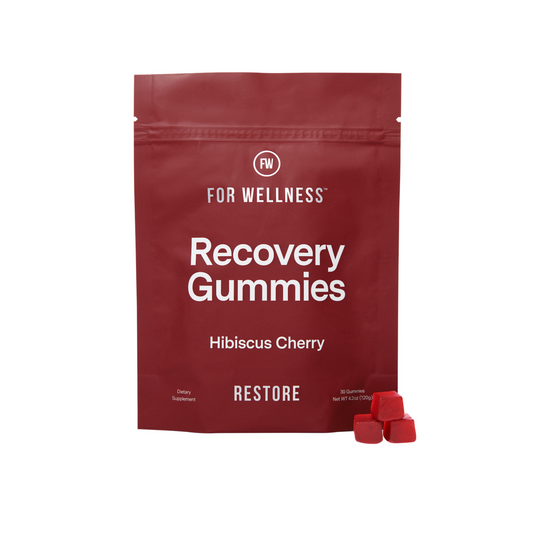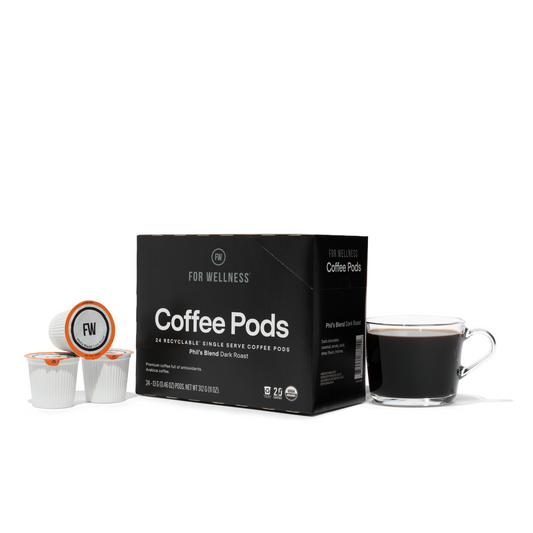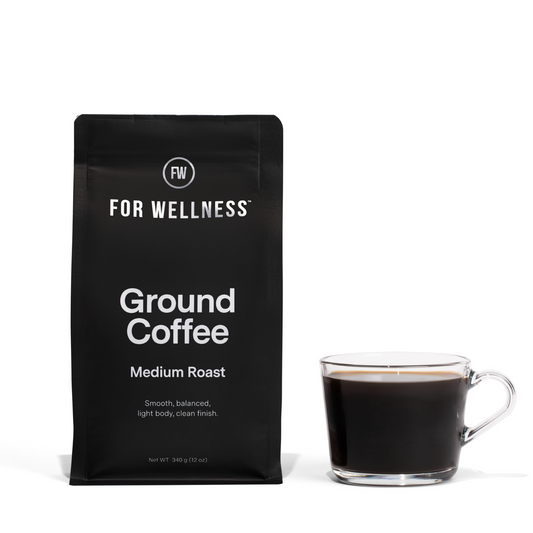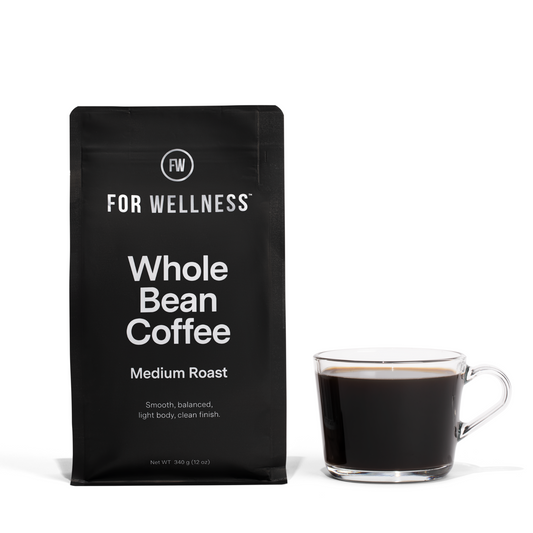According to a recent survey of 2,000 individuals, 50% of Americans now count wellness as one of their top priorities. In 2020, that number was only 42%.
The same report also found that U.S. consumers spend an estimated $450 billion each year on wellness products and services, which is projected to rise by 5% yearly.
We've become a nation bent on bettering ourselves, but are we going about it the right way?
With so many trends and resources on the market, it can be challenging to know where to begin. When you do start a new wellness routine, how can you keep it up?
Today, we're sharing seven tips to help you make the most of this new focus. Read on to discover real, sustainable ways to start a wellness routine.


The Good Stuff - Performance
-
One scoop will infuse your coffee with healthy ingredients
-
Ditch the bad stuff like sugar, dairy, and artificial creamers
-
Fights inflammation and supports skin and joint health
-
Makes your coffee taste great
1. Start Small and Make a Plan That Easily Follows Your Current Routine
When you're feeling especially supercharged and motivated, it's easy to go all out. You may feel inspired to make massive goals and huge changes, convinced that this will be the time you finally get it right.
For a while, it works.
You get up at 5 a.m. You trash all of the junk food in the house. You commit to drinking celery juice even though it makes your nose twitch.
Then, after a few days, you notice that the ambition you felt earlier has started to wane just a little. One week in, you're second-guessing everything and anxiously nibbling that chocolate bar you stashed away in the pantry in case of an emergency.
We'll call this the New Year's Eve syndrome. While it can feel pretty miserable to go through, it's more common than you might think.
Scientists have found that a staggering 92% of people ultimately fail to achieve the goals they set for themselves. The lucky 8% that do cross the finish line do things a little differently.
Set Specific, Challenging, and Reasonable Goals
Of all the things they employ, the first step is the most important. They start by setting specific and challenging goals, but nothing too hard.
What does that mean for you on your wellness journey?
It means don't try to eat the elephant all at once.
Instead of telling yourself that you'll cut out alcohol forever, start by cutting back on the number of drinks you consume each week.
Want to work out? Don't commit to spending two hours every day at the gym. Make a plan to walk around a park during your lunch break or take the stairs in your apartment or office building.
Humans are creatures of habit by nature, and when you do a 360 to your routine, it can be jarring to your physical, mental, and emotional health. Integrating slow, intentional changes into your day allows you to gently re-route your mind and body toward a healthier and happier future.
2. Eat and Drink Real Foods
We live in such a fast-paced world; it's easy to fall into the convenience trap.
Fast food can be ready in less time than it takes to finish the song on the radio. There are entire aisles in the grocery store designed to cater to our need for speed. We've grown accustomed to downplaying the role of food in our lives, seeking nourishment from anything we can grab on the go.
When you decide to embark on a health journey, start by transforming the way you approach your daily meals. Instead of reaching for anything quick and filling, consider what you're using to fuel your mind and body.
Whole foods are unprocessed, nutrient-rich, and free of chemical additives. They're chocked full of all the vitamins and minerals that your body naturally craves, and they're perfect for you. Here are 21 reasons to choose them the next time hunger strikes.
Simple Swaps, Not Deprivation
While it's wise to take an honest inventory of your diet, remember that total deprivation rarely works. Have you ever noticed that when you tell yourself you can't have something, you tend to crave it even more? It's why flash-in-the-pan diets only last so long.
Instead of eliminating every piece of processed food from your diet, start by making small, smart changes.
That creamer you're using to sweeten your morning coffee and make it more palatable? Swap it for The Good Stuff™, our performance coffee supplement that infuses your brew with healthy, natural ingredients that taste great.
The evening ice cream cone you reward yourself with? Try freezing bananas and blending them into a smooth, creamy treat. You can also trade peanut butter for tree nut butter or substitute applesauce for oil the next time you bake a cake.
These are just a few ways to take control of your health, one decision at a time. In one study, scientists compared the top, best-selling diets to determine which delivered the most health benefits.
The winner was whole foods, hands down. When you want to nourish your body and stay energized to complete the rest of your wellness goals, you can't go wrong by choosing items such as:
- Fresh fruits and vegetables
- Legumes, nuts, and seeds
- Whole grains
- Meat, fish, and eggs
When consumed regularly, whole foods may even lower your rate of certain conditions, including heart disease, cancer, and type 2 diabetes.
3. Select A Sustainable Movement Routine
Now, let's talk about exercise. In addition to feeding your body properly, engaging in healthy habits that strengthen and empower it is also important.
Regular workouts are a great way to stay energized, gain muscle, and improve longevity. However, it's important not to overdo it.
The best way to work out is to find an enjoyable, sustainable way to move and stretch your body. There isn't a one-size-fits-all routine that will work as well for you as it does for your neighbor. This is more of a personal pursuit, and you're likelier to stick with it if you genuinely enjoy it.
If you find joy and fulfillment at the gym, then think about how you can realistically squeeze a few sessions each week into your schedule.
Don't love working out with others? Search online for fitness videos that you can subscribe to or tune in to watch. If you love to break a sweat in nature, look into local hikes that you haven't tried before.
One recent study found that 34% of Americans struggle to find a workout routine they truly enjoy. Yet, seven out of 10 believed they would exercise more if they found a routine that truly worked for them.
Don't feel pressured to join the hottest new fitness club in town -- unless you want to. As long as you're moving your body regularly, you're doing wonders for yourself.
When you find a routine you love, stick with it. Studies show that people who work out even just once a week, for as little as 10 minutes a day, are happier than those who never exercise.
4. Say No To Fad Diets
Ah, fad diets. They promise so much and deliver so little. Yet, they sure are tempting. They showcase impressive results, downplay the realities of their program, and convince you that you can have a lean, chiseled physique just like the models you see on television or social media.
It's easy to see why so many people fall into this trap. Researchers estimate that 45 million Americans go on a diet each year. Of those, 50% use fad diets.
At the onset, the premise is promising. Who doesn't love the idea of losing weight quickly and easily? However, it's important to understand how fad diets get their name.
They're called this because they're based on some recent, best-selling book. Or, a Facebook post went viral, and now some publishing house is cashing in on the popularity.
Here's the unfortunate reality: While these crash diets might deliver quick results, they won't get you there the right way.
That's because these diets typically involve unbalanced and unhealthy eating plans. Take the ever-popular one-week juice cleanse, for instance. While there are many iterations of this diet, most require participants to consume around 500 to 800 ml of juice per meal, three times a day.
That equals 1500 to 2400 ml of juice per day. On top of that, most plans recommend drinking 70 ounces of water to ensure you stay hydrated. While you might lose weight at the end of the week, most of that weight loss will be water weight.
The Downfall of Fad Dieting
With fad diets like juice cleanses, there's no way to guarantee you're getting all the nutrients your body requires to function, such as protein, iron, calcium, and omega-3 fatty acids. Then, when you introduce solids back into your diet, it shocks your digestive system.
When your body can't break down solid foods, it stores them as fat. In turn, this can lead to rapid weight gain and uncomfortable bloating.
The bottom line? Fad diets don't work. Instead, fuel your body with the essential vitamins and minerals needed to stay healthy, and look for intelligent, sustainable ways to eliminate empty calories from your meals.
Foods and drinks that feel filling but don't add nutritional value include:
- Soft drinks and sports drinks
- Junk food/fast food
- Alcohol
- Processed pastries
- Candy
The next time a snack craving hits, reach for something actually good for you, like our Superfood Energy Bites! Made with high-quality whole foods, they help fight inflammation and support your brain and gut health. They also contain nootropics to help you stay calm and feel more focused.
Keeping foods like these on hand is one way to stay out of the never-ending cycle of fad diets. They might work for a day or two, but they can't deliver lasting results.
5. Take Your Sleep Seriously
Sleep plays a starring role in your health. Getting enough sleep at night allows your body to recover and repair itself from the stress it went through the day before.
Unfortunately, dreamland isn't a destination that most of us check into nightly. While adults between the ages of 18 and 64 need around seven to nine hours of sleep each night, more than 35% of all U.S. adults report sleeping fewer than seven hours.
Unsurprisingly, almost half of all Americans say they feel sleepy at least three days a week.
While your body will signal that it needs more rest, it's easy to downplay how insufficient or poor-quality sleep can damage your long-term health.
Physicians have found that when you don't get enough shut-eye, you become more at risk of developing certain conditions, including:
- Heart disease
- Kidney disease
- High blood pressure
- Diabetes
- Stroke
- Obesity
- Depression
There are a few different reasons why you might find it hard to turn off your mind at the end of the night. Some people suffer from sleep disorders or medical conditions that impact their ability to rest. If this is the case, your physician can develop a treatment plan to help you optimize your sleep hygiene, which may include counseling, exercise, or supplements.
However, most of us simply fill our schedules too close to the brim. If we aren't attending an event, we're still finding ways to stay connected -- and plugged in.
We're working from home until late or scrolling our phones in the dark. We're consuming content beyond a healthy limit and find it nearly impossible to stop.
How to Make Sleep a Priority
While it can take a while to readjust your bedtime habits, here are a few tips to help you prepare your mind and body for rest and make sleep a priority:
- Establish a regular, repeatable sleep schedule
- Limit your screen time before bed
- Create a soothing wind-down routine (e.g., warm bath, book)
- Avoid alcohol, caffeine, and nicotine at least four hours before bed
- Make your bedroom a peaceful retreat
- Only use your bed for sleeping (not working from home)
- Engage in gentle exercise
- Eat well and avoid too much sugar or processed foods
Once you make these steps a part of your night, you'll find it much easier to fall asleep and stay asleep. Your mind and body will thank you the next morning when you feel refreshed and rejuvenated.
6. Ensure You're Properly Hydrated
Drinking enough water goes hand-in-hand with getting enough sleep. Most of us know we're supposed to hydrate, but many of us do not consume adequate water daily.
While the USDA recommends that adults drink eight to 10 eight-ounce glasses each day, one study found that only 22% of U.S. adults consume that much daily.
Instead, most of us drink around five glasses of water daily, which is half the recommended amount. There are a few reasons why this might be the case. Common excuses include:
- I don't like the taste of plain water
- I'm too busy during the day to keep up with it
- I'm not thirsty
- I don't have a water source near me during the day
- I find it boring
As a result, scientists recently found that 75% of Americans are chronically dehydrated. When your body doesn't get the hydration it needs, you can develop serious health complications, including urinary and kidney problems.
In addition, you may also experience brain fog. When you're not adequately hydrated, it's harder to focus and concentrate, affecting your performance at school or work.
Luckily, plain water isn't your only option. There are plenty of delicious and nutritious ways to stay hydrated throughout the day, including:
- Eating fruits and vegetables with a high water content (e.g., melons, bell peppers, tomatoes, cucumbers)
- Drinking smoothies or milk
- Starting your day with oatmeal (the oats absorb the cooking liquid)
- Ditch heavy carbs for water-rich alternatives (e.g., zucchini noodles)
- Sip on broth-based soup or cold gazpacho
- Freeze fruit into ice pops
- Drinking iced coffee
When you don't limit yourself to plain water, a world of possibilities opens up. While H2O will always be the top way to fill up, these alternative techniques are better than no hydration at all.
7. Take Care of Your Mind
The recent pandemic put mental health into the spotlight. While taking care of your mind and emotions has always been essential, it's become more of an imperative over the last two years.
Taking care of your mind is just as important as taking care of your body. The two are more closely linked than many people realize. Left unchecked, excess stress and mental tension can lead to a host of health problems, such as:
- High blood pressure
- Heart disease
- Obesity
- Diabetes
Did you notice that this list sounds similar to the conditions you could experience without adequate sleep? That's because stress and sleep disorders are often co-occurring conditions.
There are many different ways to optimize your mental health. Yet, there isn't a one-size-fits-all trick.
What works for one person might not work for another, so it's important to understand what helps you feel the most relaxed, energized, and optimistic. A few steps that can help include:
- Seeking out social connections, especially face-to-face interactions with friends and family members
- Talking to someone about issues or stressors you're experiencing
- Staying active and moving your body
- Engaging in a relaxation practice, such as meditation
- Making sleep a priority
- Nourishing your body with healthy foods and drinks
- Finding habits that appeal to your senses
Sometimes, even something as small as walking in nature can help revitalize your mental health. Consider what brings you joy, and look for ways to weave those activities into your daily life. Even the smallest act, such as preparing your cup of coffee in the morning, can help you shake away stress and improve your perspective.
Start Your New Wellness Routine Today
The new year is a time to think about revitalizing your wellness routine. Yet, too often, these best-laid plans fall by the wayside. It becomes too stressful to keep them up, and we slip back into our old ways.
This is why it's wise to start intentionally. Set realistic goals, and give yourself time and space to finish them. Reward small steps of progress.
Along the way, we're here to help. For Wellness products can help you supercharge your health journey, one step at a time. Check out our core collections today.

